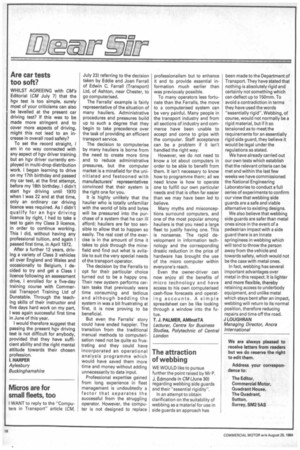Micros are for small fleets, too
Page 22

If you've noticed an error in this article please click here to report it so we can fix it.
I WANT to reply to the "Computers in Transport" article (CM, July 23) referring to the decision taken by Eddie and Joan Farrall of Edwin C. Farrall (Transport) Ltd, of Ashton, near Chester, to go computerised.
The Farralls' example is fairly representative of the situation of many hauliers. Administrative procedures and pressures build up to such a degree that they begin to take precedence over the task of providing an efficient transport service.
The decision to computerise by many hauliers is borne from the need to create more time and to reduce administrative pressures, but the computer market is a minefield for the uninitiated and festooned with manufacturers' representatives convinced that their system is the right one for you.
It is highly unlikely that the haulier who is totally unfamiliar with the world of bits and bytes will be pressured into the purchase of a system that he can ill afford; hauliers are far too sensible to allow that to happen so easily. The real cost of the exercise is in the amount of time it takes to pick through the minefield and find out what is avilable to suit the very special needs of the transport operator.
The decision by the Farralls to opt for their particular choice turned out to be a happy one. Their new system performs certain tasks that previously were time consuming and tedious and although bedding the system in was a bit frustrating at first, it is now proving to be beneficial.
But even the Farralls' story could have ended happier. The transition from the traditional manual methods to computerisation need not be quite so frustrating and they could have incorporated an operational analysis programme which would have saved them more time and money without adding unnecessarily to data input.
Professional expertise gained from long experience in fleet management is undoubtedly a factor that separates the successful from the struggling operator. However, the computer is not designed to replace professionalism but to enhance it and to provide essential information much earlier than was previously possible.
To many operators less fortunate than the Farralls, the move to a computerised system can be very painful. Many people in the transport industry and from all sections of industry and commerce have been unable to accept and come to grips with the computer. Staff acceptance can be a problem if it isn't handled the right way.
However, we do not need to know a lot about computers in order to be able to benefit from them. It isn't necessary to know how to programme them; all we need know is how to operate one to fulfill our own particular needs and that is often far easier than we may have been led to believe.
Many myths and misconceptions surround computers, and one of the most popular among hauliers is that you need a large fleet to justify having one. This is nonsense. The rapid development in information technology and the corresponding drastic reduction in the price of hardware has brought the use of the micro computer within everyone's reach.
Even the owner-driver can now enjoy all the benefits of micro technology and have access to his own computerised cash-flow forecasts and operating accounts. A simple spreadsheet can be like looking through a window into the futue.
T. J. PALMER, AMInstTA Lecturer, Centre for Business Studies, Polytechnic of Central London












































































































